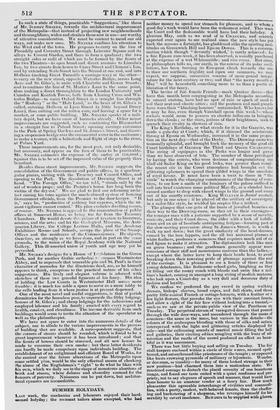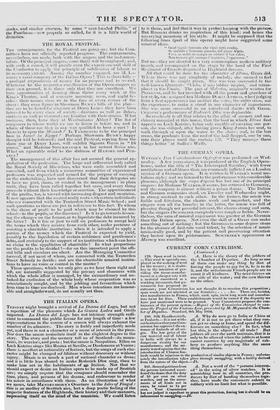SUMMER HOLYDAYS.
LAST week, the mechanics and labourers enjoyed their hard- earned holyday ; the recusant tailors alone excepted, who had
neither money to spend nor stomach for pleasure, and to whom a good day's work would have been the welcomest relief. This week the Court and the fashionable world have had their holyday. A
glorious May, such as we read of in CHAUCER, and scarcely expected ever again to see realized since the new style has put
back the seasons a fortnight, has gladdened alike the sporting mul- titudes on Greenwich Hill and Epsom Downs. This is a consum. motion which though " devoutly wished," is rarely achieved : fur
a fine Epsom race-week, it has been observed, is usually purchased at the expense of a wet Whitsuntide; and vice versa. But since, as philosophers tells us, our earth, in the course of its polar oscil-
lations, has been turning its European cheek towards the sun to thaw our northern frigidity and ripen our summers, we may expect, we suppose, successive seasons of more genial tempe- rature for the next century or two; and that " the merry month of May " will be henceforth something more to us than a poetic al- literation of the fancy.
The bevies of fair female Friends—meek Quaker doves—that have this month been congregating in the Metropolis according to annual custom, have had no spot of rain or speck of mud to soil their neat and chaste attire; and the postmen and mail guards have worn their " blushing honours" untarnished. Who knows but
it may be fine, even though Vauxhall opens this week ?—whist rockets would seem to possess an electric influence in bringing down the clouds ; or the stars, jealous of their brightness, seek to quench their rivalry in showers of rain.
The King's Birthday, or what stands for it in the Gazette, was made a gala-day at Court; which, if it thinned the aristocratic throng at Epsom on Wednesday, increased it in the same propor- tion on the next day—that of the Derby. The Drawing-room was unusually splendid, and brought back the memory of the good old
Court birthdays Of GEORGE time Third and Queen CHARLOTTE.
The string of equipages in the Parks was longer and gayer than we have observed of late. The number of' those privileged by having the entriie, who were desirous of congratulating our bluff old Sailor King on his good looks, was greater than usual: the recent stir in the Court atmosphere had brought out the glittering ephemera to spread their gilded wings in the sunshine of royal favour. It must have been a treat to those in "tile circle" to watch the changing countenances of the throng of cour- tiers, to see how a smile of the luminary of the palace sufficed to call into brief existence some political v or a clouded brow caused another to drop with closed wings o the ground and creep
out of his courtly existence. King WILLIAM is Jovial enough, but only in one sense : if he played off the artillery of sovereignty in a sailor-like style, he wielded his sceptic like a trident.
The glimpse that one gets of the busts of jewelled beauties on their way to the Drawing-room, as they sit in their carriages—
the younger ones with a patience supported by a sense of novelty, curiosity, and their Court dress, the elder with a look of indiffe- rence and an air of lassitude anticipating fatigue—forming part of the slow-moving procession along St.fames s Street, is worth a walk up and down ; but the great similarity of the head-dresses, caused by the lace lappets, and the all but universal plumes of white feathers, produces a sameness that requires much aid of air and figure to make it attractive. The diplomatists look like men on grave business ; and the gentlemen generally appear more
conscious of their stiff and monotonous costume than the ladies,—
except where the latter have to keep their heads bent, to avoid breaking down their towering pride of plumage against the roof
of the carriage. It is pleasant to see a family of three or four
young debutantes, like frolicsome school-girls, laughing as they sit filling out the roomy coach with blonde and satin like a mil-
liner's basket, coming in amongst a long string of modish matrons, who look upon a Court-day as a very dull and decorous duty of fashion and loyalty.
We confess we preferred the gay crowd in spring walking dresses, bishops' sleeves, broad capes, and full skirts, and those pretty little conical French or cottage-bonnets, with a feather or a few light flowers, that provoke the eye with their succinct fronts, and allow a sight of the fair face without looking into a tunnel,— such as we saw at the private-public view of the Pantheon on Tuesday. The perpetual stream of variegated dresses that poured through the wide door-ways, and meandered through the maze of counters—the same in the mass, but various in the details—the colours of the arabesques blending with those of silks and satins, interspersed with the light and glittering articles displayed for sale—and the enlivening sounds of martial music filling the hall and galleries, their circling eddies mingling with the buzz of ad- miration and the rustle of the crowd produced an effect as beau- tiful as it was uncommon.
There was but little buying and selling on Tuesday. The fair stall-keepers enclosed within a circle of trieir wares, seemed spell- bound, and sat enthroned like priestesses of the temple; or appeared like busts crowning pyramids of millinery or bijouterie. Wonder, or decorum, or timidity—for many of them looked strange in their new position—had charmed them into a motionless state. We mustered courage to disturb the placid serenity of one beauteous image, and found our taste suited with a quiet readiness and pro- priety, not to say elegance of speech and mutter, that would have done honour to an amateur vender at a fancy fair. How much pleasanter this agreeable interchange of civilities and commodi- ties, with a pretty, modest, well-behaved female, than the chaffer- ing and huckstering of a shopman, who revenges himself for his servility by covert insolence. Be it ours to be supplied with gloves,
stocks, and similar etcetera, by some " neat-handed Phillis " of the Pantheon—new proterly so called, for it is a little world of divinities.





















 Previous page
Previous page